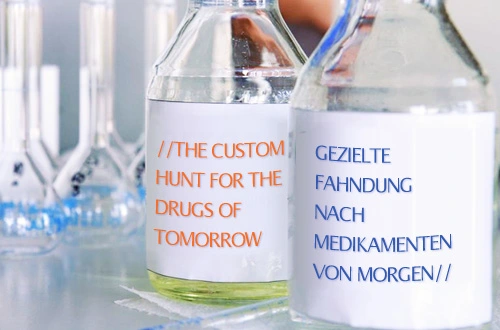The custom hunt for the drugs of tomorrow
Costly clinical tests, controversial experiments on animals, and undesired side effects for patients – the development of new drugs has many obstacles to overcome. With its modern analytical methods, biotechnology is becoming ever more important for medical research as a tool for the earliest possible testing of a preparation’s side effects.
Holger Wenschuh is still suffering a little from jetlag. A graduate chemist and Managing Director of the Adlershof biotech company JPT Peptide Technologies, he has just returned from a mile long tour of presentations in California. “In the USA there is a huge interest in our products,” he explained. Set up in 2004, his company specialises in peptides. These protein fragments can be synthesised from amino acids and, when combined on a biochip, help to analyse the effects e.g. of new vaccines.
JPT operates not only as a service provider, but also in drug research. Together with the Spanish companies IUCT and Leitat, this Adlershof company intends to enhance the effects of a chemotherapeutic agent that can be used against a range of cancerous tumours. “The agent is highly effective, but exhibits too great a toxicity on healthy cells as well,” confessed Wenschuh. The researchers are working on a synthetic molecule that docks specifically on cancer cells where it then releases the drug. Tumour cells differ from healthy ones in that they require a greater blood supply and increase production of certain protein receptors on their surfaces. “We want to develop a protein that bonds precisely to these receptors,” explained Wenschuh. The project has received 200,000 from EU funds. In the first stage, there will be tests in the Petri dish, and by 2013 the researchers want to demonstrate the success of their method in tests with mice. Wenschuh estimates at least ten years before a drug is produced that can be used on cancer patients.
The unwanted side effects of drugs on human cells also occupy Hubert Köster, founder of the biotech company Caprotec. “Often, drugs react not only with the target protein, but also with others,” he explained, a graduate chemist who has already set up a number of successful biotech companies, adding that the consequences for patients include serious side effects. With their Capture Compound Mass Spectrometry (CCMS), Köster and his colleagues have developed an analytical technology that can fish out of a huge quantity of human proteins the culprits that cause the drug’s undesired interactions.
The Caprotec experts were able, for instance, to demonstrate why a drug to treat Parkinson’s disease can cause liver damage. CCMS molecules, however, can also be custom designed for the analysis of other drug groups, e.g. for reducing blood pressure or cholesterol levels. “That our technology can help us to understand interactions in the human proteome at an early stage is a huge cost advantage for the development of drugs – and could also contribute towards cutting costs in the health care system,” explained Köster. He can certainly look forward to a deluge of customer requests.
by Claudia Wessling
Links:
